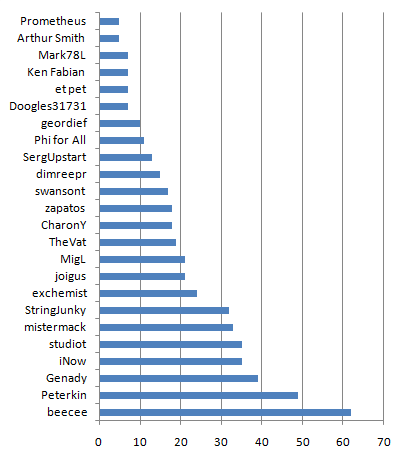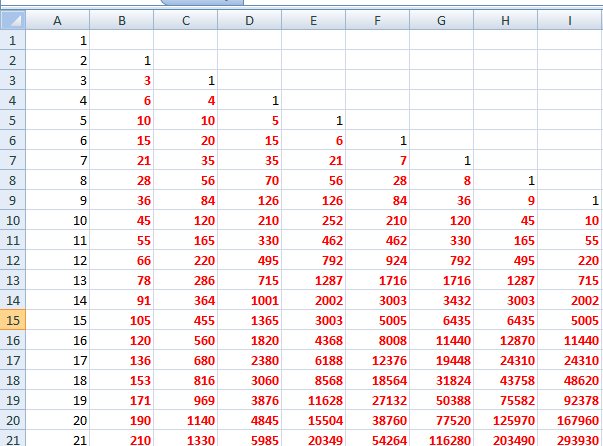-
Posts
5374 -
Joined
-
Days Won
52
Content Type
Profiles
Forums
Events
Everything posted by Genady
-
(I have added the numbers to the quote above.) 1. I don't know how to separate an effect of color from that of other factors. 2. Fractions of a second. 3. No. 4. No. 5. No. 6. See #1.
-
I would like to include other factors, especially demographics, but (a) I don't have that information, and (b) the set is small as is, doesn't make sense statistically to make clusters. As I've mentioned, curiosity. These data perhaps have some answers, we just don't know the questions yet. I believe that accumulation of resources for undetermined utility is a key to progress. Some of it at some time will be handy, or crucial. That's why it will be done at random times and the "subjects" won't know when they are observed and when they are not. Eventually, the habituation will take over and the "subjects" will behave normally.
-
I do plan so. Not consecutive weeks necessarily, but perhaps random weeks from time to time.
-
Yep. Somewhat similar here. I read books via Kindle for PC, and the forums window is open on the background, so I notice when something new appears there. Then I go to check at the next convenient stop.
-
I was curious about how many and how often post in the forums. Here are the numbers for the week from Saturday, January 29 to Friday, February 4. Including only the members with more than 3 posts in the week.
-

Does a Static EM Field Acquire Mass Due to Stored Energy?
Genady replied to exchemist's topic in Relativity
To be even more precise, we should add that the last condition is required only for the on-shell i.e. non-virtual massless particles -
Not directly about the topic question, but still rep points related. I've noticed a long time member with 10 posts in total and marked with 10 rep points, but when I look at their posts I don't see any flags at all. How come?
-
I've had the same thought, but I feel too new here still to make this suggestion. I do agree and support and +1.
-

Does a Static EM Field Acquire Mass Due to Stored Energy?
Genady replied to exchemist's topic in Relativity
There are more than one way to arrive to a definition of momentum, e.g. as a conserved quantity associated with space translation invariance as per Noether's theorem. But as a conserved quantity in the Lorentz covariant 4-momentum for a massive particle, it is p=mγv "p(v) = mγ v = mv[1 + v2/2c2 +···]." (Weinberg, Steven. Foundations of Modern Physics (p. 109).) -

Does a Static EM Field Acquire Mass Due to Stored Energy?
Genady replied to exchemist's topic in Relativity
And, in the 115+ years since then, the physics has proceeded very carefully and has found a clear and efficient way to deal with these concepts. The "mass" is generally a term for the invariant mass, an inherent property of a particle (or, a specific coefficient in a QFT Lagrangian), i.e. "the rest mass". The "other numbers [] obtained for the mass" are not in use, nor are the "other definitions [] of the force and the acceleration". -
I immediately have three non-technical questions regarding this proposal: 1. In what way is it an "insurance policy"? When and how this storage would be used? 2. Why is it better than 'the Svalbard Seedbank in Norway, also known as the "doomsday vault"'? 3. They say, "Because human civilization has such a large footprint, if it were to collapse, that could have a negative cascading effect on the rest of the planet." Negative? I'd think rather positive, if any.
-
Well, this is where "unrealistic" starts IMO. To discover the sources of materials, first. We - not robots - cannot yet figure out water on Mars, after a long time trying, observing, experimenting, sending multiple probes, etc. On / in a next door neighbor. Can we program a machine to do something that we don't know ourselves how to do? I don't think so. That's even before smelting and refining you've mentioned.
-
How / where from do they get materials needed to make another machine?
-
I agree with this. Moreover, I don't see what is so special about being self-replicating. A machine X can be programmed to build a machine Y. This is a robot. As a particular case, it can be that Y=X. This makes it self-replicating. Big deal!
-

Does a Static EM Field Acquire Mass Due to Stored Energy?
Genady replied to exchemist's topic in Relativity
But in SR the correct equation is not E=mc2 but rather E2-p2c2=m2c4, isn't it? Not even mentioning its different meaning. -
A former colleague of mine is very enthusiastic about prospects of large scale space exploration based on self-replicating von Neumann probes. I've never heard of them before. From a brief reading of several Internet articles, it seems to me not realistic. Not the self-replicating aspect of it, but what it will be replicating, i.e. the fully automated explorers. Do you know of strong arguments I could use to curb his enthusiasm?
-
His enthusiasm seems to run out in about 2010. After that, he contributed two chapters in somebody else's books on astrobiology, in 2014 and 2017. The rest is chemistry. His society's website seems not to be refreshed also since some time in the first decade of this century. That's what I've found.
-
According to the list of publications by Prof. Claudius Gros (Prof. Claudius Gros - Publications (uni-frankfurt.de)) he published his proposal of the Genesis Project in 2016 (Developing ecospheres on transiently habitable planets: the genesis project | SpringerLink). This publication caused a series of interviews and articles in popular science magazines. He then mentioned "genesis mission" - not a "project" - once again in 2019 (Why planetary and exoplanetary protection differ_ The case of long duration genesis missions to habitable but sterile M-dwarf oxygen planets (uni-frankfurt.de)). He has published 20 articles after that, but nothing about the genesis missions/project. Hmm... BTW, in the article of 2019 he says regarding the oxygen rich sterile planets, "It is presently not known if the resulting primordial oxygen atmosphere, which may differ drastically from planet to planet in volume, would inhibit life to originate in first place." He also says there, "Financing a deep-space mission taking several millennia cannot be justified along the lines of solar system exploration, viz for the advancement of science." FYI
-
I wonder, why all the references I can find to the Genesis Project discussed here, are from the years 2016-2017 and nothing after that?
-
Yep. And no amount of tinkering with Bayesian probabilities will change this fact.
-
Here is a little Excel "experiment" to test uniqueness. n goes vertically, k goes horizontally. Column A corresponds to (n,1) and is populated by hand with n. This is one boundary condition. Cells on the diagonal correspond to n=k and are populated by hand with 1. This is another boundary condition. All the red cells are populated with the recursive equation, (n,k)=(n-1,k)+(n-1,k-1). They are automatically and uniquely populated by Excel.



